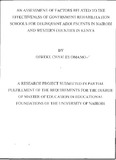| dc.description.abstract | The problem concerning adolescence delinquency is a Kenyan social Phenomenon of most concern and impact of delinquency on the adolescence, their families and the society at large and the relationship between delinquency and adult crime, which is also on the rise. It has been argued that delinquency leads to adult crime and therefore a lifelong career. There is need therefore to deal with adolescence delinquency to curb the trend of adolescents maturing to adulthood with criminal behaviours.
The Government of Kenya has established rehabilitation schools with the aim of correcting and reforming the delinquent adolescents into productive citizens. The rehabilitation schools then have programmes designed to meet this objective. The study is aimed at assessing the factors related to the effectiveness of rehabilitation schools with particular attention to the availability of the rehabilitative programmes, the availability of the rehabilitative qualities of the rehabilitators, parent's involvement, school environment and at identifying the intervention measures that can increase the effectiveness.
This is done using a descriptive survey with the target population being the children, staff members of the rehabilitation schools in Nairobi and Kakamega. Stratified random sampling was applied to get samples of the sub groups in the population. The research instruments were questionnaireS, interview schedules and observation check list while data collection procedures were structured interviews and observations. The data was analyzed using both manual and computer programs and presented using descriptive statistics in form of percentages and frequency distribution. The study found that the adolescents had inadequate perception about the rehabilitation schools and process.
Proper orientation process was also not in place. The rehabilitation programmes, education, spiritual, guidance and counseling and recreation were found to be in place but enhancements on them were suggested by both the adolescents and staff members. Parents were found to be minimally involved that is only in the provision of basic needs to their children. There was need to put new physical facilities and renovate the old one especially at Dagoretti Rehabilitation School.
Various recommendations were also suggested which included proper orientation that include the adolescents and staff members, regular attendance to refresher courses and opportunities to be availed for the parents to be involved in the rehabilitation process which could include family therapy restorative conference. The study also recommended that this study be done in other rehabilitation schools outside Nairobi and Kakamega to help in making general conclusion for the whole Nation for interaction measures to be taken. This study also suggested a study on the relevance of the reception centre. | en_US |

